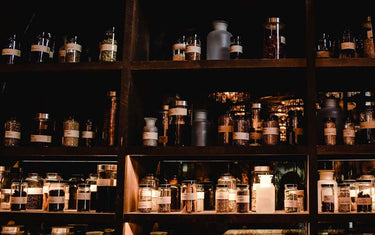4 min read / 30 November 2021 / Caitlin Devlin
The legend behind Four Bandits Oil and its ingredients
This ancient remedy is backed by a fascinating mythology.

Stories of how this powerful remedy came into public knowledge can vary wildly, with some linking the oil to 14th century Toulouse and others to 17th century Marseille.
Regardless of its exact origins, this blend of essential oils has been celebrated for its protective properties throughout history, often regarded as one of the most effective historical remedies for combating infection.
Whatever the truth may be, the folklore behind this oil is fascinating, and there’s no disputing the significant benefits it still holds for our health all these years later – however many years later that actually is. The combination of potent antibacterial essential oils in this blend continues to be valued for its potential to support immune health and ward off harmful microbes.

The story
The most popular version of the story begins in the 1300s, an era in which Europe and Asia were ravaged by bubonic plague.
With the population dwindling and the streets emptying, making an honest living became more difficult, and so an enterprising group of bandits decided to use the situation to their advantage and began robbing the dead and dying.
The plague was known to be incredibly contagious, and so these bandits came up with an ingenious way to protect themselves from the disease.
They would infuse a vinegar with various herbs and spices that they would then wear on their skin to help guard against infection.
It’s important to understand here that the 14th century understanding of infection was very flawed.
The popular theory at the time was that the disease rotted you from the inside. If pieces of rot from a dead or dying person became airborne and entered your body through the nose or mouth, you too would begin to rot from the inside which would lead the plague to kill you.
Medieval medicine had no understanding of germs.
The bandits were attempting to prevent these bits of rotting matter from entering their airways by surrounding themselves with a much stronger smell, protecting themselves from smelling the rot.
It was thought that the rot would then not enter the airways because the stronger smell would keep it out.
This became such a popular solution that cities began paying to have entire streets fumigated with strong herbal scents.

The oil worked, but not because of its strong scent.
The bandits had unwittingly picked many ingredients with antibacterial, immune-guarding, and insect-repellent properties – this last is particularly important, as the plague was transmitted by fleas.
Whilst they thought that their invention was protecting them with its strong scent, it was actually hard at work combatting the microbes that were attempting to infect their bodies.
Most versions of the story agree that the bandits were eventually caught. Some say that their oil was so valuable that they were able to give up the recipe to avoid being executed.
Others say that they were caught quite early on and made to bury dead plague victims as a punishment. In this version, the oil protected them from death.
It’s hard to verify any of these versions. What we do know, however, is that this isn’t the only time in history that stories of four bandits oil have appeared.
A similar mixture can be traced back all the way to the era of Hippocrates, and various versions of the herb-infused oil or vinegar appear throughout the following centuries.
Today, many households still use four bandits oil to guard against infection.

What's in it?
Reports of the ingredients in the original four bandits oil vary, but most versions today use some combination of the following essential oils:

Clove Bud
Clove bud is known to be excellent for the immune system, and studies in 2005 and 2021 have documented its ability to fight infections.
Eugenol, one of its main constituents, has been shown to inhibit inflammation and oxidative stress on cells, preventing damage and helping your body to remain at its strongest.

Lemon
The presence of d-limonene in lemon essential oil is said to be what gives the oil its strong antimicrobial and antifungal properties.
Lemon is a popular ingredient in home cleaners due to its powerful hygienic qualities and its fresh scent.

Cinnamon
Cinnamon oil is a popular choice for fighting parasites – some research has even suggested that it could be useful against malaria.
It is a potent antimicrobial with the ability to fight bacteria and fungus.

Eucalyptus
The constituent eucalyptol in eucalyptus oil has been shown to be effective against a number of bacteria.
A study in 2012 found that it was even effective against infections such as staph and E.coli.

Rosemary
Rosemary is known for its ability to protect the body against damage, in particular the liver, as it is hepatoprotective.
It also reduces stress, which leaves the body in a better condition to combat harmful microorganisms.

Four Bandits oil doesn’t just protect our health – it connects us to a piece of medical history.
This warm, spicy blend is a particular favourite in the colder month, when the rate of infection is higher and cosy scents make a chilly house feel like home.
Try making your own from the ingredients listed above, or use our expertly created Four Bandits Essential Oil Blend.
Sign up for a wholesale account to save on our essential oils, perfect for creating your own DIY essential oil blend.










